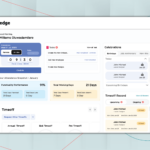
The Insider’s Guide to NHF Contributions: What Every Employer Should Know

Improved employee self-service features
Ensuring Accurate PAYE Tax Calculations in Nigeria
In the intricate web of financial management for businesses in Nigeria, accurate payroll processing stands as a cornerstone. One crucial aspect of this process is the Pay As You Earn (PAYE) tax, commonly known as the Paye tax. In this article, we delve into the intricacies of Paye tax calculations and explore the pivotal role they play in maintaining financial precision for businesses.
Understanding Paye Tax in Nigeria
The Basics: Paye tax is a progressive taxation system in Nigeria where employees’ income tax is deducted at source by their employers. It ensures a consistent and timely collection of income tax, contributing to the nation’s revenue and overall economic stability.
Components of Paye Tax: Paye tax calculation involves considering various components such as basic salary, allowances, bonuses, and other benefits. Each element contributes to the overall taxable income, forming the basis for accurate tax deductions.
Navigating the Calculation Process
Taxable Income Computation: Begin by identifying all components of an employee’s income, including any taxable allowances. Sum these up to determine the gross income for taxation purposes.
Applying Tax Rates: Nigeria’s PAYE tax system employs progressive tax rates. As income increases, the applicable tax rate also rises. It’s crucial to accurately apply the correct tax rate to each income bracket to ensure compliance and fairness.
Deductions and Exemptions: Certain deductions and exemptions are allowed, such as pension contributions and National Housing Fund (NHF) deductions. These play a role in reducing the taxable income and subsequently the amount of Paye tax.
The Impact of Accurate Paye Tax Calculations
Compliance and Legal Obligations: Accurate income tax calculations ensure that your business remains compliant with Nigerian tax laws. This not only helps avoid legal issues but also fosters a positive relationship with tax authorities.
Employee Trust and Morale: Employees appreciate transparency in payroll processing. Ensuring accurate Paye tax deductions builds trust and morale among the workforce, showcasing the organization’s commitment to ethical business practices.
Financial Planning and Budgeting: Precision in income tax calculations facilitates better financial planning for both businesses and employees. It provides a clear picture of the tax liabilities, allowing for accurate budgeting and resource allocation.
Best Practices for Payroll Precision
- Regular Updates on Tax Laws: Stay informed about changes in tax laws to ensure that your payroll system is always aligned with the latest regulations.
- Invest in Technology: Utilise modern payroll software that automates calculations, reducing the risk of human errors and improving efficiency.
- Employee Education: Educate your employees on the components of their salary and how Paye tax is calculated. This fosters transparency and helps them understand their financial obligations.
Conclusion
In the dynamic landscape of Nigerian business, accurate Paye tax calculations are not just a legal requirement but a strategic imperative. By embracing precision in payroll processing, businesses can navigate the complexities of taxation, foster employee trust, and contribute to the overall economic stability of the nation. Payroll precision is not just a financial obligation; it’s a commitment to excellence in every aspect of business operations.
BizEdge: All-in-one HR, Payroll and Productivity Solutions for Modern Businesses.
